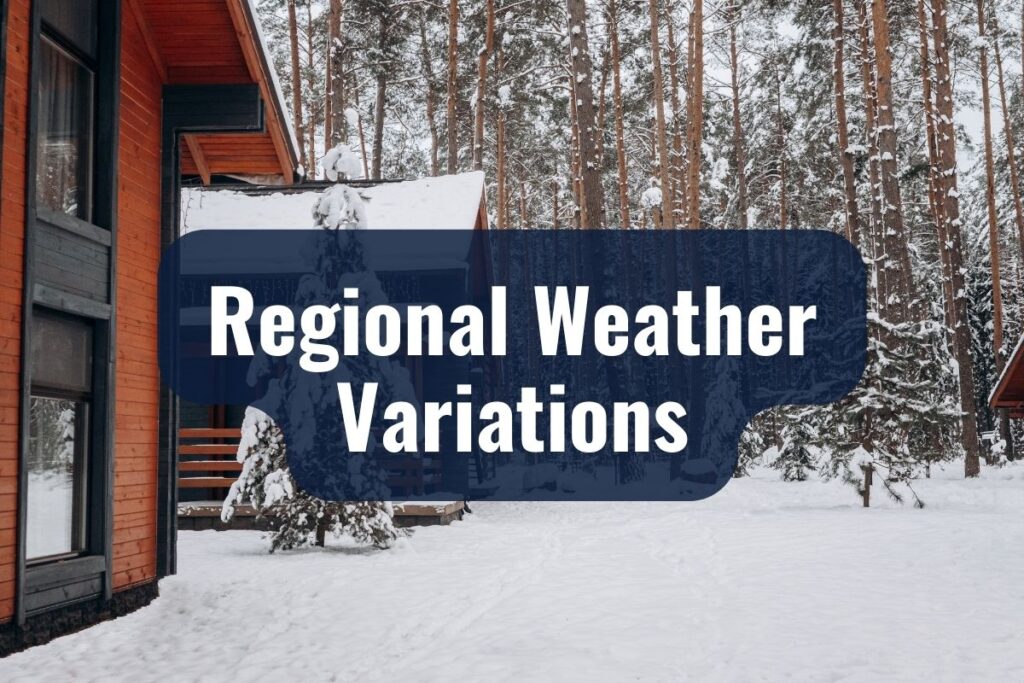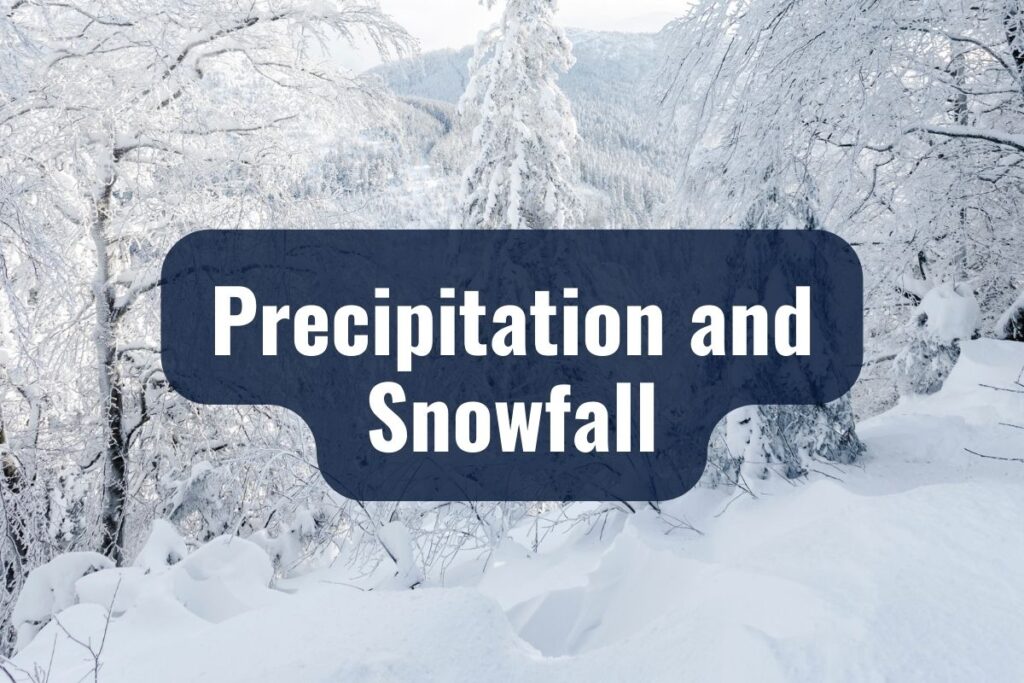The weather in December can vary significantly across the country, influenced by the Atlantic Ocean in the west, the Mediterranean Sea in the south, and the mountains like the Alps and the Pyrenees.
In this article, we’ll delve deeper into what December typically looks like across different French regions, offer practical advice on how to dress and what to expect, and provide resources to keep you updated on weather conditions.
KEY TAKEAWAYS
- Diverse Climate Zones: France’s weather varies significantly by region, affecting temperatures and precipitation in December.
- Preparation is Key: Dressing in layers and staying informed about weather forecasts are essential for comfort and safety.
- Regional Temperature Variance: Northern France is cooler and wetter, while the South enjoys milder winter temperatures.
- Snowfall Varies Widely: Eastern and mountainous areas see more snow, while the West and South experience less.
- Shorter Days: December has limited daylight hours, affecting daily routines and mood.
- Festive Atmosphere: Despite the cold, December is a festive month with many outdoor events that require weather-appropriate attire.
Understanding France’s Climate Zones
France is divided into several distinct climate zones:
The North and Northwest: These areas experience an oceanic climate with mild winters and cool summers. December is often chilly, with frequent cloud cover and rain.
The East and Northeast: A semi-continental climate dominates these regions, bringing colder winters and warmer summers. December can be quite cold, with snow more likely, especially in areas adjacent to the mountains.
The South: The Mediterranean climate here means mild to warm winters and hot summers. December is generally milder, especially along the coast, making it a favorable destination for those seeking respite from harsher northern climates.
Central and the Paris Basin: Exhibiting an intermediate climate, December typically sees cool to cold temperatures with varying amounts of precipitation.
Why Weather Knowledge is Important
For foreigners living in or visiting France, understanding the seasonal weather is more than just a matter of comfort—it’s about being prepared. December marks the onset of winter, bringing shorter days, potential snowfall in certain areas, and a festive atmosphere as cities and towns across the country light up for the holiday season.
Knowing what to expect weather-wise helps in planning everything from daily commutes to weekend getaways, ensuring that your time in France is enjoyable and safe.
Regional Weather Variations

The weather in France during December can vary significantly from one region to another due to its diverse geography and climate zones. Understanding these variations is crucial for planning daily activities and travel during this winter month.
Northern France: A Cool and Cloudy December
Cities like Lille, Rouen, and Amiens: Characterized by their proximity to the English Channel, these areas typically experience cool temperatures and a fair amount of cloud cover in December. The average temperature hovers around 3°C to 7°C (37°F to 45°F).
Weather Phenomena: Expect frequent rain and cloudy days, with occasional frosty mornings. Snow is less common but not unheard of, particularly towards the end of the month.
Western France: Atlantic Influence
Cities such as Nantes, Rennes, and Bordeaux: The Atlantic Ocean heavily influences the climate here, bringing milder temperatures and higher humidity compared to the east. Temperatures generally range from 5°C to 10°C (41°F to 50°F).
Weather Characteristics: Rainfall is more common and can be heavy at times. While snow is rare, the dampness can make the air feel colder, so waterproof clothing is advisable.
Eastern France: Cold and Sometimes Snowy
Strasbourg, Dijon, and along the Alps: This region has a more continental climate, with colder temperatures and a higher likelihood of snow, particularly in the mountainous areas.
Temperature and Snow: December is one of the coldest months, with average temperatures ranging from -2°C to 4°C (28°F to 39°F), and snowfall is more common, especially in the Alpine regions.
Southern France: Mild Mediterranean Winters
Cities like Marseille, Nice, and Montpellier: Enjoying a Mediterranean climate, these areas generally have the mildest winter weather in France. Temperatures are usually milder, ranging from 8°C to 14°C (46°F to 57°F).
Weather Outlook: While it’s relatively warmer, occasional cold winds like the Mistral can significantly lower temperatures. Rainfall is less frequent than in the north but can occur in heavy, short bursts.
Temperature Ranges
December marks the transition into the heart of winter for France, bringing a chill to the air across the country. The temperature can vary significantly between regions, influenced by geographical diversity. Here’s what you might expect in terms of temperature ranges in key areas during December.
| Region | Average Temperature Range (°C) | Notes |
| Northern France | 3°C–7°C | Cool, often cloudy |
| Eastern France | -2°C–4°C | Cold, higher chance of snow |
| Southern France | 8°C–14°C | Milder, Mediterranean influence |
| Western France | 5°C–10°C | Mild, influenced by the Atlantic |
Temperature Overview in Key French Cities
Paris: The capital experiences chilly winters. In December, temperatures typically range from 3°C to 7°C (37°F to 45°F). While it’s cold, severe freezing temperatures are rare, but cold winds make it feel brisker.
Lyon: Situated further east, Lyon has colder winters, with temperatures often ranging from 0°C to 8°C (32°F to 46°F). Proximity to the Alps means it can experience some colder spells, especially at night.
Marseille: Representing the south, Marseille enjoys a milder climate, with December temperatures usually between 6°C and 13°C (43°F to 55°F). The city’s coastal position moderates the winter chill, though the Mistral wind can bring sudden cold snaps.
Strasbourg: In the northeast, close to Germany, Strasbourg’s December weather is colder, often ranging from -1°C to 5°C (30°F to 41°F). Its Christmas markets are famous, but visitors should bundle up against the cold.
Northern and Western France
In the north and west, influenced by the maritime climate, temperatures are generally milder compared to the east but can feel colder due to humidity and wind. Coastal areas benefit from the ocean’s moderating effect, preventing extreme cold but often resulting in damp, chilly weather.
Eastern France
The east, with its continental climate, tends to have more marked temperature differences. Winters are colder, and December can see sub-zero temperatures, particularly at night or in more elevated areas. The proximity to mountain ranges like the Alps and Jura also means that colder, snowy weather is more common here.
Southern France
The south, particularly along the Mediterranean coast, enjoys the warmest temperatures in December. However, it’s still winter, and while days might be mild and pleasant, nights can be cool. Coastal cities experience a moderate climate, but mountainous areas like the Pyrenees can be much colder and more snow-prone.
Temperature Fluctuations
Temperature fluctuations can occur due to various factors, including altitude, proximity to the sea, and local winds like the Mistral in the south or the Tramontane in the southwest. These winds can dramatically lower temperatures over short periods, making it feel much colder than average.
Precipitation and Snowfall

December in France is characterized by varied precipitation patterns, including rain and snowfall, which significantly affect the landscape and daily life. Here’s how precipitation and snowfall are distributed across different regions of the country during this winter month.
General Precipitation Trends
Overall Pattern: December is one of the wetter months for many parts of France, especially in the north and west, due to the prevailing westerly winds bringing moist air from the Atlantic.
Rainfall: Rain is more frequent and sometimes heavy, particularly in the coastal regions of the west and northern parts of the country. Cities like Paris, Nantes, and Bordeaux typically experience several days of rain throughout December.
Snowfall in France
Eastern and Northeastern France: Areas closer to the Alps, Jura, and Vosges mountains, like Strasbourg, Lyon, and Grenoble, are more likely to see snowfall in December. The proximity to these mountain ranges means colder temperatures and greater chances of snow, often resulting in picturesque winter landscapes.
Mountainous Areas: The Alps, Pyrenees, and other mountainous regions usually have substantial snow by December, making them popular destinations for winter sports enthusiasts. Towns and ski resorts in these areas are well-equipped for the snowy conditions, but visitors need to be prepared for winter driving conditions and colder temperatures.
Northern and Western Regions: While these areas are less likely to have snow compared to the east, occasional snowfall is not unheard of, especially in northern inland areas. However, it generally does not last long before melting.
Southern France: The Mediterranean coast sees the least snow, with mild temperatures often preventing snowfall entirely. However, higher elevations in the southern Alps and inland areas can experience significant snow, contrasting sharply with the nearby coastal areas.
Implications of Precipitation and Snowfall
Daily Life and Travel: Understanding the precipitation and snowfall patterns is crucial for planning daily activities and travel. Rain can lead to wet conditions and occasionally flooding in certain areas, while snowfall might affect transportation, requiring winter tires or chains in mountainous regions.
Enjoying Winter Activities: For those looking to enjoy the festive atmosphere or partake in winter sports, knowing where and when snowfall is expected can help in choosing the right destination and ensuring a pleasant experience.
Daylight and Sunshine Hours
As December ushers in the winter season in France, the daylight and sunshine hours decrease, significantly impacting daily activities and the general mood. Understanding these changes is crucial for making the most of the shorter days.
Decreasing Daylight Hours
Shortest Day of the Year: December includes the winter solstice, usually around December 21st or 22nd, marking the shortest day and longest night of the year.
Impact on Daily Life: The reduced daylight affects everything from people’s moods to the rhythm of outdoor activities. It’s especially noticeable for foreigners from countries closer to the equator, where daylight hours vary less throughout the year.
Regional Variations in Sunshine
Northern France: Cities like Paris and Lille experience limited sunshine in December, averaging around 2 to 3 hours per day. The days can often be grey and overcast, which is typical for this region during the winter.
Eastern France: Areas like Strasbourg and Lyon have similar sunshine hours to the north but with clearer days interspersed between the overcast weather, especially when cold, dry continental air dominates.
Southern France: The Mediterranean coast, including cities like Nice and Marseille, enjoys more sunshine, averaging 4 to 5 hours per day. The region often has clearer skies, providing a respite from the typically greyer northern climates.
Coping with Limited Sunshine
Outdoor Activities: It’s important to take advantage of the available daylight for any outdoor activities, whether it’s a brief walk during lunchtime or scheduling outings for the brightest part of the day.
Vitamin D and Mood: The lack of sunshine can affect vitamin D levels and mood, known as Seasonal Affective Disorder (SAD). Residents and visitors alike are encouraged to find ways to stay active and seek light, whether through outdoor activities or using special light therapy lamps.
Wardrobe Recommendations

Dressing appropriately for the December weather in France is crucial to staying comfortable and enjoying the winter season, whether you’re engaging in daily activities or exploring the country. Here are some wardrobe recommendations to consider based on the regional climate variations.
Layering: A Key Strategy
Base Layer: Start with a moisture-wicking base layer, especially if you’re going to be active outdoors. This layer keeps you dry by drawing sweat away from your skin.
Insulating Layer: Add a warm insulating layer, such as a wool sweater or a fleece, to retain body heat.
Outer Layer: Top it off with a waterproof and windproof jacket. Look for features like a hood, and make sure it’s breathable to allow moisture to escape.
Specific Recommendations by Region
Northern and Western France: Prepare for damp and chilly weather. A waterproof coat or umbrella is essential due to frequent rains. Warm hats, gloves, and scarves will protect against the wind and rain.
Eastern France: Expect colder temperatures, especially near the mountains. A down jacket or heavy coat, thermal leggings, and warm boots are recommended. Don’t forget accessories like thermal gloves, a warm hat, and a scarf.
Southern France: While milder, evenings can still be cool. Opt for lighter layers that you can add or remove as needed. A medium-weight jacket or coat should suffice, along with standard winter accessories.
Footwear
Waterproof Boots: A good pair of waterproof boots is crucial, especially in snowy or rainy areas. Look for options with non-slip soles to navigate slippery streets.
Comfortable Walking Shoes: If you’re in a city with less harsh weather, comfortable and warm walking shoes are a must for exploring.
Accessories
Hats, Gloves, and Scarves: These are essential for all regions in December. They can easily be taken off and stored when you go indoors.
Sunglasses: Despite shorter days, the sun can still be bright, especially if reflecting off snow in the mountainous regions. Sunglasses will protect your eyes and reduce glare.
Special Considerations
Holiday Events: If attending any special events or holiday markets, consider a more formal coat or additional stylish accessories to elevate your look.
Outdoor Activities: For those planning to ski or enjoy other outdoor winter sports, specialized gear like thermal socks, waterproof gloves, and a suitable ski jacket will be necessary.
Holiday Weather and Events
December in France is a festive time, with numerous holiday events and celebrations taking place across the country. The weather plays a significant role in these activities, affecting everything from the ambiance to the practicalities of attending outdoor events.
Impact of Weather on Holiday Events
Christmas Markets: Found in many towns and cities, Christmas markets are a highlight of the season. In northern and eastern France, where it’s colder, these markets often feel quite festive, with potential light snowfall adding to the ambiance. Attendees should dress warmly, as most markets are outdoors.
Outdoor Light Displays and Decorations: Cities like Paris, Lyon, and Strasbourg are famous for their beautiful holiday lights and decorations. Crisp, cold evenings are ideal for walking tours to enjoy these displays, though a warm coat and hot drink are advisable.
New Year’s Celebrations: Outdoor events on New Year’s Eve can be particularly cold, especially in the northern and eastern regions. Planning for a warm outfit is essential if you intend to join outdoor festivities or fireworks displays.
Notable December Events Affected by Weather
Fête des Lumières in Lyon
This festival of lights in early December features stunning light installations throughout the city. While the event is mesmerizing, the weather can be quite cold, and occasionally foggy, so warm, layered clothing is recommended.
Christmas Celebrations
From midnight masses to outdoor nativity scenes and concerts, many Christmas celebrations occur outdoors or in older, less-heated buildings. Warm, comfortable clothing allows you to fully enjoy these experiences.
Winter Sports Events
In the Alpine regions, December marks the beginning of the ski season, with various events and competitions taking place. The weather is a critical factor for these activities, and attendees should be prepared for snowy conditions and cold temperatures.
Weather Contingencies for Holiday Plans
Check Forecasts: Always check the weather forecast when planning to attend any event. Last-minute changes due to weather are more common in winter months.
Plan for Indoor Alternatives: Have a backup plan in case of particularly bad weather. Many cities offer excellent museums, galleries, and indoor attractions that can be enjoyed regardless of the weather outside.
Practical Tips for Daily Life

Navigating daily life in France during December’s winter weather requires some preparation and adaptability. Here are practical tips to handle the cold, precipitation, and shorter daylight hours effectively.
Transportation and Mobility
Check Weather and Traffic Updates Regularly
Winter weather can impact public transportation and road conditions. Stay updated with local news or transportation apps for any delays or closures.
Winterize Your Vehicle
If you’re driving, ensure your vehicle is ready for winter conditions. This includes having winter tires, antifreeze, and an emergency kit with blankets and supplies.
Plan Extra Travel Time
Bad weather can slow down transportation. Allow extra time for commutes, especially during peak holiday travel periods.
Maintaining Comfort and Safety at Home
Heating and Insulation
Ensure your home is well-insulated and your heating system is functioning properly. Keep a supply of heating fuel or wood if you use a fireplace or wood stove.
Prevent Pipes from Freezing
In colder regions, take steps to prevent pipes from freezing, such as insulating pipes and keeping your home at a steady temperature.
Emergency Kit
Have a basic emergency kit with candles, matches, flashlights, and extra batteries in case of power outages.
Health and Wellness
Dress Appropriately
As mentioned in the wardrobe section, layering is key. Keep extremities warm with hats, gloves, and scarves.
Stay Active
Combat the shorter days and colder weather by staying active. Indoor activities, gyms, or brisk walks can help maintain health and mood.
Hydrate and Moisturize
Cold air can be dry. Stay hydrated and use moisturizer to protect your skin from getting dry and chapped.
Socializing and Enjoying the Season
Outdoor Activities
Take advantage of clear days for outdoor activities. Even in cold weather, a sunny day can be perfect for a walk or visiting local attractions.
Attend Local Events
Many towns offer winter events and activities that can be enjoyable if you’re prepared for the weather.
Stay Connected
Shorter days can lead to feelings of isolation, especially for foreigners away from home. Keep in touch with friends and family and participate in community or expat group activities.
By following these practical tips, foreigners living in or visiting France can navigate the December weather more comfortably and safely. Whether it’s dealing with transportation issues, keeping warm and healthy, or simply enjoying the festive season, being prepared for the weather’s impact on daily life allows for a more enjoyable and stress-free winter experience in France.
Useful Resources
Météo France: The official French meteorological service provides detailed weather forecasts, warnings, and alerts for all regions of France. Available online and as an app.
Weather Websites and Apps: Popular global websites and apps like AccuWeather, Weather.com, and BBC Weather provide localized forecasts and can be set to alert you to severe conditions.
SNCF (Société Nationale des Chemins de fer Français): For those traveling by train, the SNCF website and app provide real-time updates on train schedules and any delays or cancellations due to weather.
Local Public Transportation Websites: Most urban areas in France have a dedicated website for public transportation (buses, trams, metros) with updates on service disruptions.
112: The European emergency number works in all EU countries, including France, for immediate assistance.
Prefecture and Local Government Websites: Local prefecture or municipal websites often provide updates on weather-related emergencies, road closures, and safety advisories.
Pharmacies and Health Services: Keep a list of local pharmacies and medical services. In France, pharmacies often display a green cross and can provide basic health advice and supplies.
French Red Cross (Croix-Rouge française): Provides information on health and safety, including what to do in various emergencies.


